BULAW5916 Assignment: Harding Cases and Tax Implications
VerifiedAdded on 2022/11/30
|12
|2555
|281
Report
AI Summary
This report provides a detailed analysis of the Harding v Commissioner of Taxation cases ([2018] FCA 837 and [2019] FCAFC 29), focusing on their implications for Australian expats and taxation law. The assignment examines the complexities surrounding tax residency, the application of the ordinary concepts test, and the definition of a 'permanent place of abode' under Australian tax law. It explores how these cases have clarified the tax liabilities of Australians living and working overseas, offering relief from potentially unfair taxation practices. The report also delves into the implications of these judgements for the Australian Taxation Office (ATO) and the broader understanding of tax law concerning international residents. The analysis considers the flaws in previous judgements, the limitations of the ordinary concepts test, and the importance of a broader interpretation of 'permanent place of abode,' ultimately highlighting the benefits of the Harding cases for Australian expats by reducing their tax liabilities and clarifying their obligations. The report covers key aspects of the Income Tax Assessment Act 1936 and 1997, and other relevant legal precedents, providing a comprehensive overview of the cases' impact on Australian taxation.
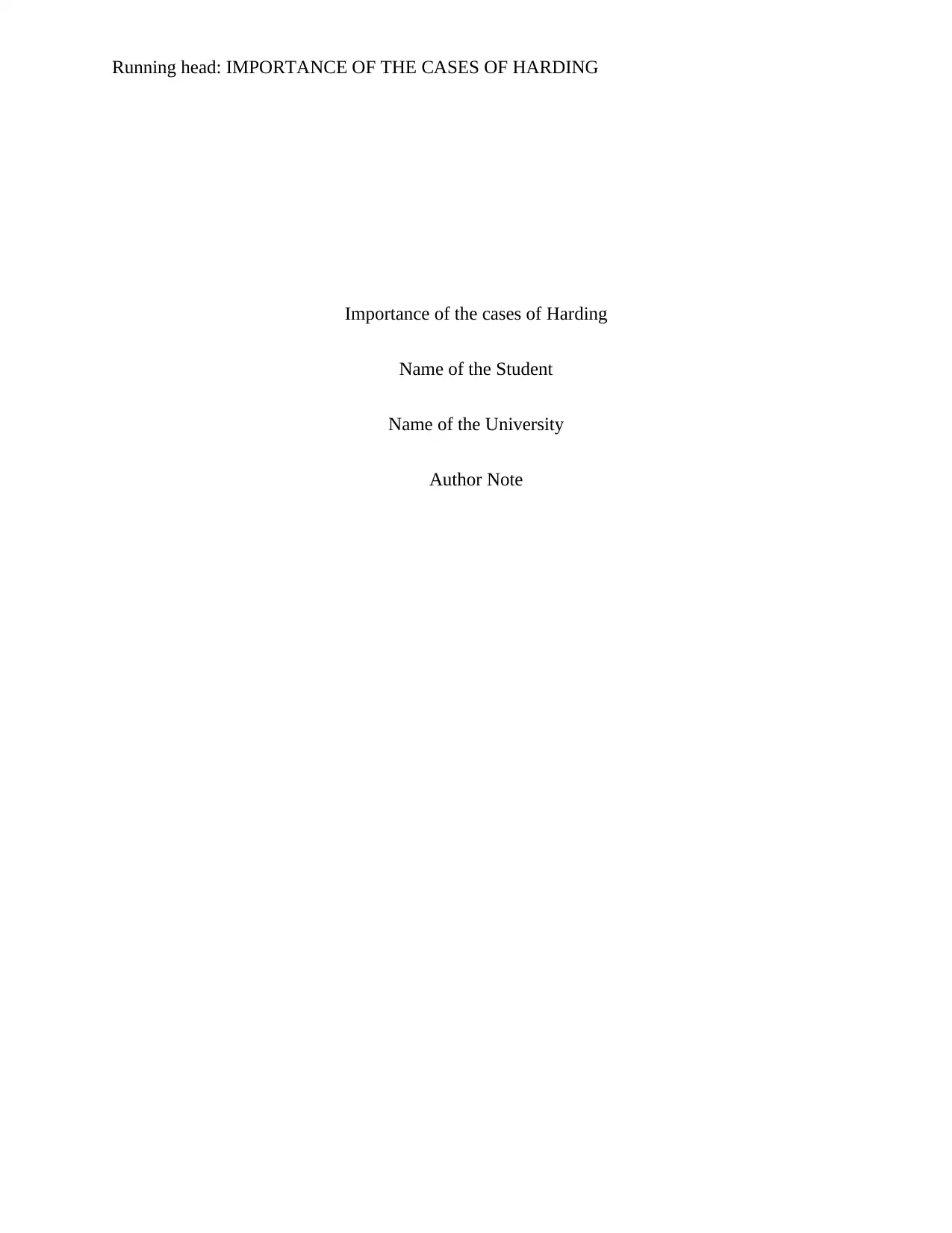
Running head: IMPORTANCE OF THE CASES OF HARDING
Importance of the cases of Harding
Name of the Student
Name of the University
Author Note
Importance of the cases of Harding
Name of the Student
Name of the University
Author Note
Paraphrase This Document
Need a fresh take? Get an instant paraphrase of this document with our AI Paraphraser
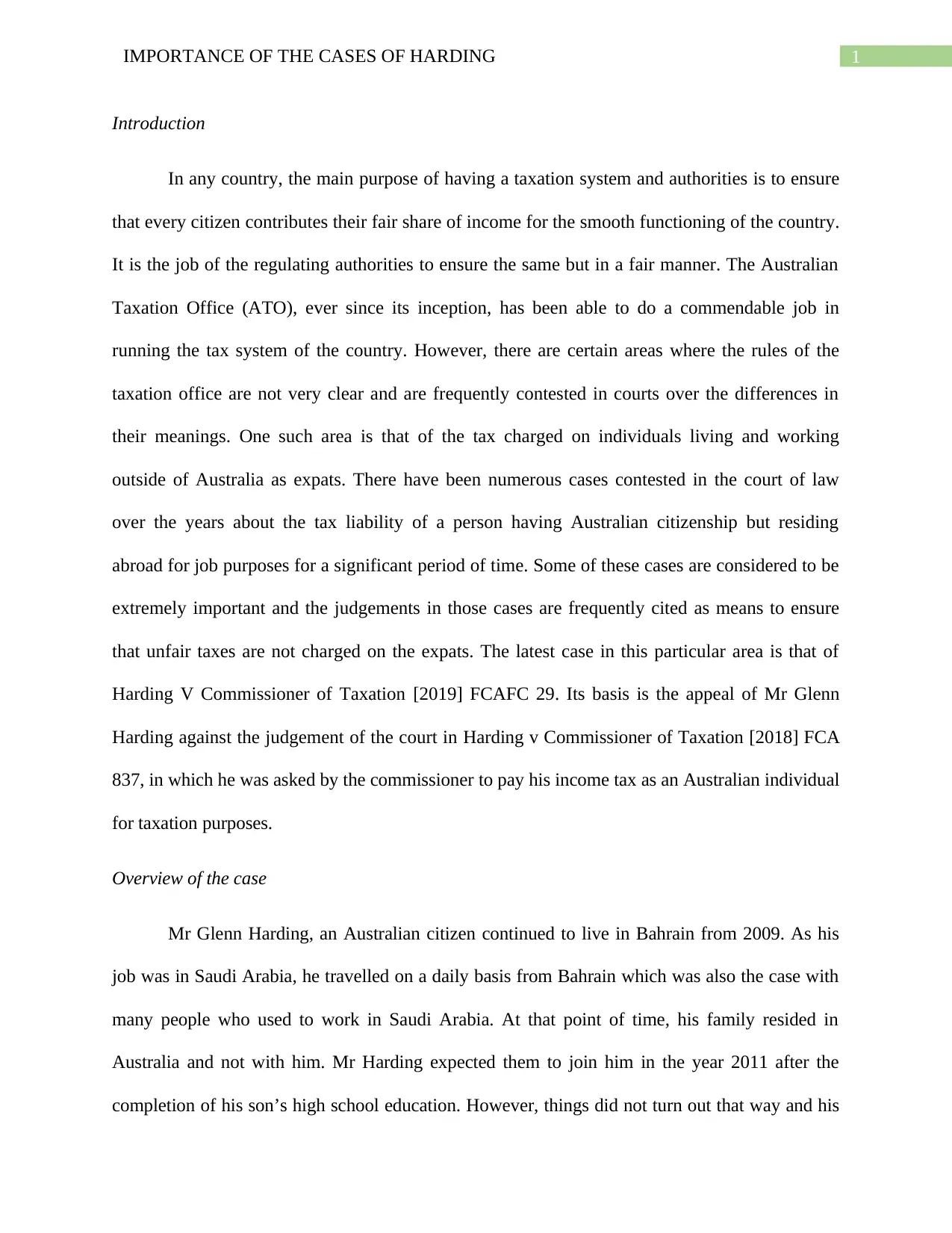
1IMPORTANCE OF THE CASES OF HARDING
Introduction
In any country, the main purpose of having a taxation system and authorities is to ensure
that every citizen contributes their fair share of income for the smooth functioning of the country.
It is the job of the regulating authorities to ensure the same but in a fair manner. The Australian
Taxation Office (ATO), ever since its inception, has been able to do a commendable job in
running the tax system of the country. However, there are certain areas where the rules of the
taxation office are not very clear and are frequently contested in courts over the differences in
their meanings. One such area is that of the tax charged on individuals living and working
outside of Australia as expats. There have been numerous cases contested in the court of law
over the years about the tax liability of a person having Australian citizenship but residing
abroad for job purposes for a significant period of time. Some of these cases are considered to be
extremely important and the judgements in those cases are frequently cited as means to ensure
that unfair taxes are not charged on the expats. The latest case in this particular area is that of
Harding V Commissioner of Taxation [2019] FCAFC 29. Its basis is the appeal of Mr Glenn
Harding against the judgement of the court in Harding v Commissioner of Taxation [2018] FCA
837, in which he was asked by the commissioner to pay his income tax as an Australian individual
for taxation purposes.
Overview of the case
Mr Glenn Harding, an Australian citizen continued to live in Bahrain from 2009. As his
job was in Saudi Arabia, he travelled on a daily basis from Bahrain which was also the case with
many people who used to work in Saudi Arabia. At that point of time, his family resided in
Australia and not with him. Mr Harding expected them to join him in the year 2011 after the
completion of his son’s high school education. However, things did not turn out that way and his
Introduction
In any country, the main purpose of having a taxation system and authorities is to ensure
that every citizen contributes their fair share of income for the smooth functioning of the country.
It is the job of the regulating authorities to ensure the same but in a fair manner. The Australian
Taxation Office (ATO), ever since its inception, has been able to do a commendable job in
running the tax system of the country. However, there are certain areas where the rules of the
taxation office are not very clear and are frequently contested in courts over the differences in
their meanings. One such area is that of the tax charged on individuals living and working
outside of Australia as expats. There have been numerous cases contested in the court of law
over the years about the tax liability of a person having Australian citizenship but residing
abroad for job purposes for a significant period of time. Some of these cases are considered to be
extremely important and the judgements in those cases are frequently cited as means to ensure
that unfair taxes are not charged on the expats. The latest case in this particular area is that of
Harding V Commissioner of Taxation [2019] FCAFC 29. Its basis is the appeal of Mr Glenn
Harding against the judgement of the court in Harding v Commissioner of Taxation [2018] FCA
837, in which he was asked by the commissioner to pay his income tax as an Australian individual
for taxation purposes.
Overview of the case
Mr Glenn Harding, an Australian citizen continued to live in Bahrain from 2009. As his
job was in Saudi Arabia, he travelled on a daily basis from Bahrain which was also the case with
many people who used to work in Saudi Arabia. At that point of time, his family resided in
Australia and not with him. Mr Harding expected them to join him in the year 2011 after the
completion of his son’s high school education. However, things did not turn out that way and his
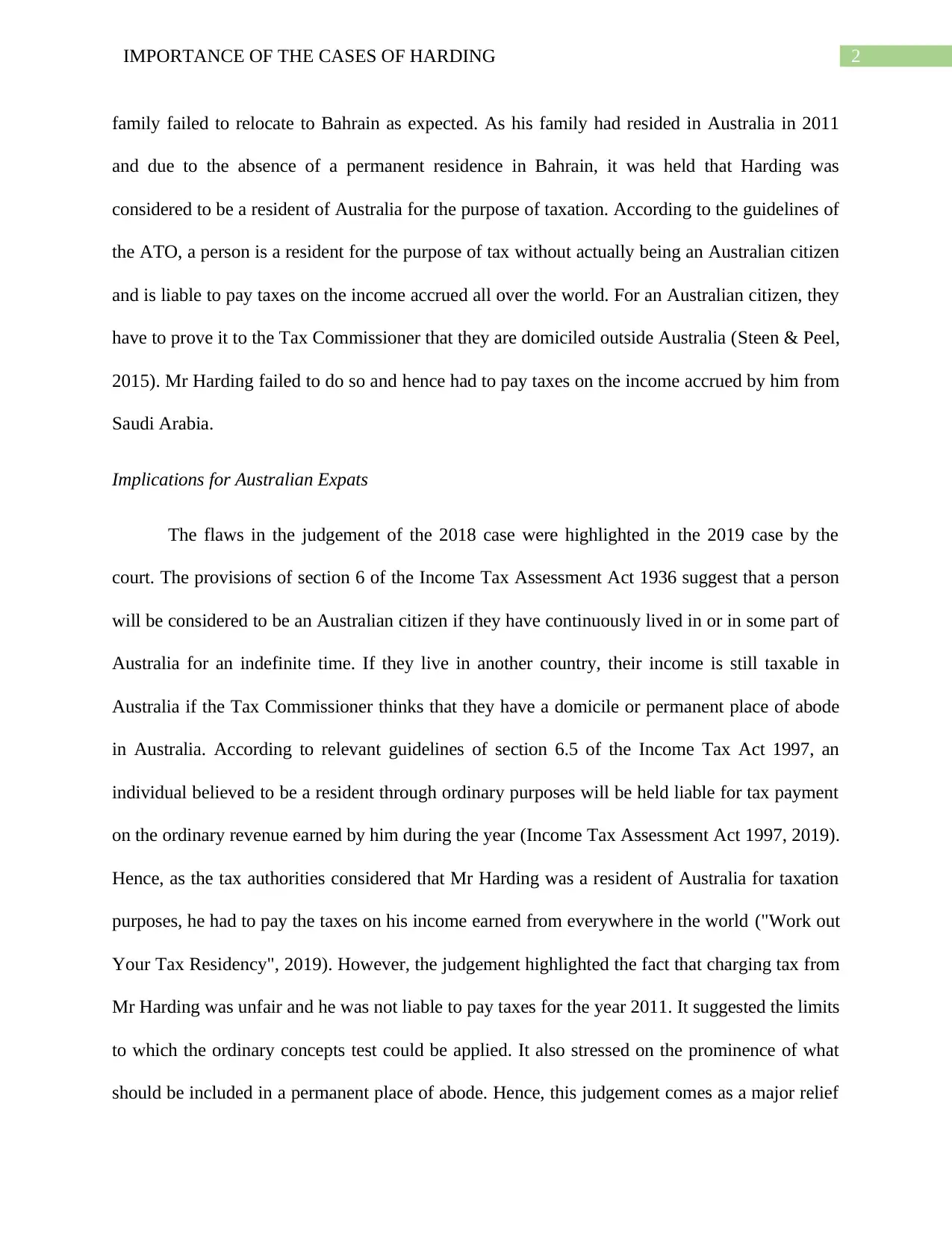
2IMPORTANCE OF THE CASES OF HARDING
family failed to relocate to Bahrain as expected. As his family had resided in Australia in 2011
and due to the absence of a permanent residence in Bahrain, it was held that Harding was
considered to be a resident of Australia for the purpose of taxation. According to the guidelines of
the ATO, a person is a resident for the purpose of tax without actually being an Australian citizen
and is liable to pay taxes on the income accrued all over the world. For an Australian citizen, they
have to prove it to the Tax Commissioner that they are domiciled outside Australia (Steen & Peel,
2015). Mr Harding failed to do so and hence had to pay taxes on the income accrued by him from
Saudi Arabia.
Implications for Australian Expats
The flaws in the judgement of the 2018 case were highlighted in the 2019 case by the
court. The provisions of section 6 of the Income Tax Assessment Act 1936 suggest that a person
will be considered to be an Australian citizen if they have continuously lived in or in some part of
Australia for an indefinite time. If they live in another country, their income is still taxable in
Australia if the Tax Commissioner thinks that they have a domicile or permanent place of abode
in Australia. According to relevant guidelines of section 6.5 of the Income Tax Act 1997, an
individual believed to be a resident through ordinary purposes will be held liable for tax payment
on the ordinary revenue earned by him during the year (Income Tax Assessment Act 1997, 2019).
Hence, as the tax authorities considered that Mr Harding was a resident of Australia for taxation
purposes, he had to pay the taxes on his income earned from everywhere in the world ("Work out
Your Tax Residency", 2019). However, the judgement highlighted the fact that charging tax from
Mr Harding was unfair and he was not liable to pay taxes for the year 2011. It suggested the limits
to which the ordinary concepts test could be applied. It also stressed on the prominence of what
should be included in a permanent place of abode. Hence, this judgement comes as a major relief
family failed to relocate to Bahrain as expected. As his family had resided in Australia in 2011
and due to the absence of a permanent residence in Bahrain, it was held that Harding was
considered to be a resident of Australia for the purpose of taxation. According to the guidelines of
the ATO, a person is a resident for the purpose of tax without actually being an Australian citizen
and is liable to pay taxes on the income accrued all over the world. For an Australian citizen, they
have to prove it to the Tax Commissioner that they are domiciled outside Australia (Steen & Peel,
2015). Mr Harding failed to do so and hence had to pay taxes on the income accrued by him from
Saudi Arabia.
Implications for Australian Expats
The flaws in the judgement of the 2018 case were highlighted in the 2019 case by the
court. The provisions of section 6 of the Income Tax Assessment Act 1936 suggest that a person
will be considered to be an Australian citizen if they have continuously lived in or in some part of
Australia for an indefinite time. If they live in another country, their income is still taxable in
Australia if the Tax Commissioner thinks that they have a domicile or permanent place of abode
in Australia. According to relevant guidelines of section 6.5 of the Income Tax Act 1997, an
individual believed to be a resident through ordinary purposes will be held liable for tax payment
on the ordinary revenue earned by him during the year (Income Tax Assessment Act 1997, 2019).
Hence, as the tax authorities considered that Mr Harding was a resident of Australia for taxation
purposes, he had to pay the taxes on his income earned from everywhere in the world ("Work out
Your Tax Residency", 2019). However, the judgement highlighted the fact that charging tax from
Mr Harding was unfair and he was not liable to pay taxes for the year 2011. It suggested the limits
to which the ordinary concepts test could be applied. It also stressed on the prominence of what
should be included in a permanent place of abode. Hence, this judgement comes as a major relief
⊘ This is a preview!⊘
Do you want full access?
Subscribe today to unlock all pages.

Trusted by 1+ million students worldwide
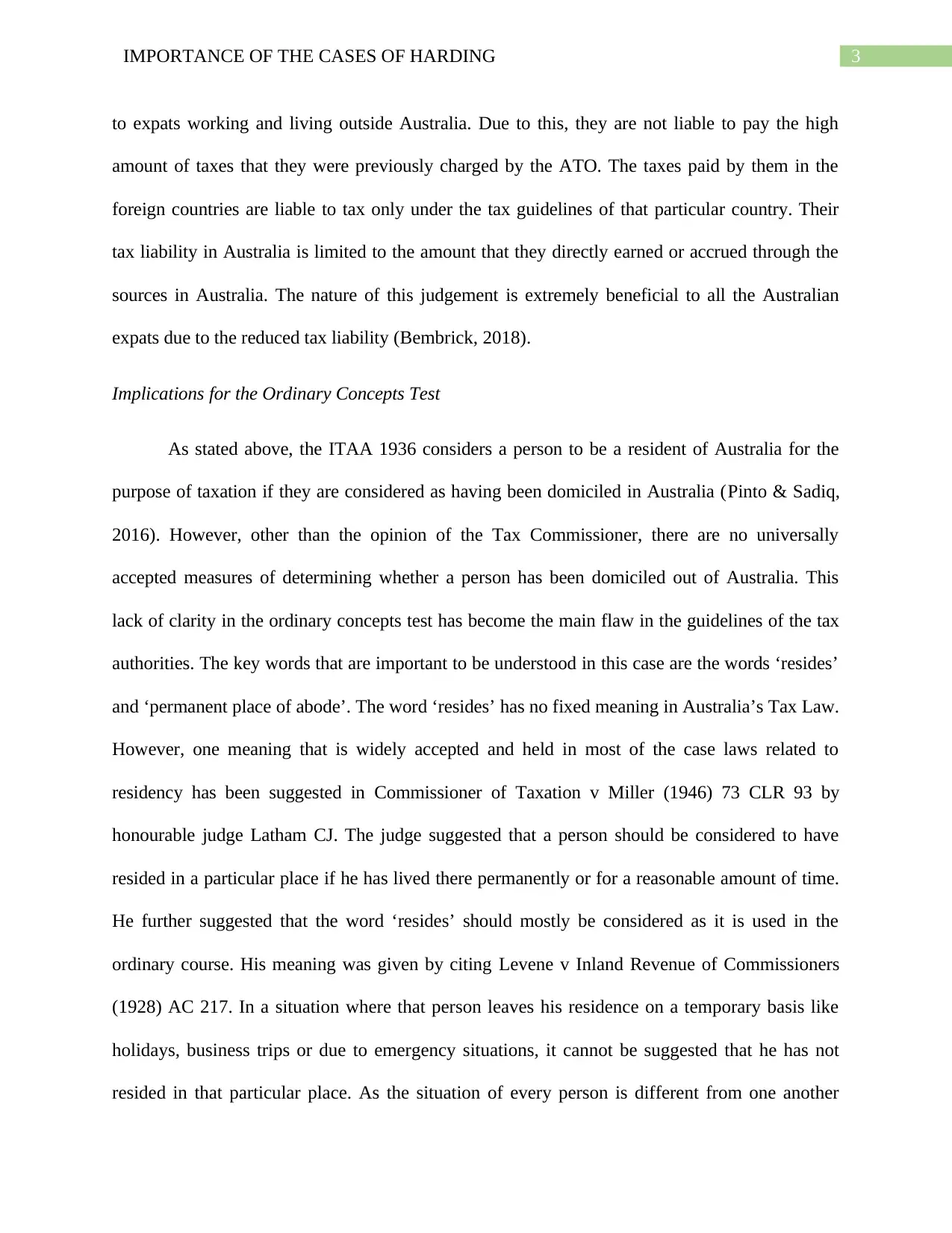
3IMPORTANCE OF THE CASES OF HARDING
to expats working and living outside Australia. Due to this, they are not liable to pay the high
amount of taxes that they were previously charged by the ATO. The taxes paid by them in the
foreign countries are liable to tax only under the tax guidelines of that particular country. Their
tax liability in Australia is limited to the amount that they directly earned or accrued through the
sources in Australia. The nature of this judgement is extremely beneficial to all the Australian
expats due to the reduced tax liability (Bembrick, 2018).
Implications for the Ordinary Concepts Test
As stated above, the ITAA 1936 considers a person to be a resident of Australia for the
purpose of taxation if they are considered as having been domiciled in Australia (Pinto & Sadiq,
2016). However, other than the opinion of the Tax Commissioner, there are no universally
accepted measures of determining whether a person has been domiciled out of Australia. This
lack of clarity in the ordinary concepts test has become the main flaw in the guidelines of the tax
authorities. The key words that are important to be understood in this case are the words ‘resides’
and ‘permanent place of abode’. The word ‘resides’ has no fixed meaning in Australia’s Tax Law.
However, one meaning that is widely accepted and held in most of the case laws related to
residency has been suggested in Commissioner of Taxation v Miller (1946) 73 CLR 93 by
honourable judge Latham CJ. The judge suggested that a person should be considered to have
resided in a particular place if he has lived there permanently or for a reasonable amount of time.
He further suggested that the word ‘resides’ should mostly be considered as it is used in the
ordinary course. His meaning was given by citing Levene v Inland Revenue of Commissioners
(1928) AC 217. In a situation where that person leaves his residence on a temporary basis like
holidays, business trips or due to emergency situations, it cannot be suggested that he has not
resided in that particular place. As the situation of every person is different from one another
to expats working and living outside Australia. Due to this, they are not liable to pay the high
amount of taxes that they were previously charged by the ATO. The taxes paid by them in the
foreign countries are liable to tax only under the tax guidelines of that particular country. Their
tax liability in Australia is limited to the amount that they directly earned or accrued through the
sources in Australia. The nature of this judgement is extremely beneficial to all the Australian
expats due to the reduced tax liability (Bembrick, 2018).
Implications for the Ordinary Concepts Test
As stated above, the ITAA 1936 considers a person to be a resident of Australia for the
purpose of taxation if they are considered as having been domiciled in Australia (Pinto & Sadiq,
2016). However, other than the opinion of the Tax Commissioner, there are no universally
accepted measures of determining whether a person has been domiciled out of Australia. This
lack of clarity in the ordinary concepts test has become the main flaw in the guidelines of the tax
authorities. The key words that are important to be understood in this case are the words ‘resides’
and ‘permanent place of abode’. The word ‘resides’ has no fixed meaning in Australia’s Tax Law.
However, one meaning that is widely accepted and held in most of the case laws related to
residency has been suggested in Commissioner of Taxation v Miller (1946) 73 CLR 93 by
honourable judge Latham CJ. The judge suggested that a person should be considered to have
resided in a particular place if he has lived there permanently or for a reasonable amount of time.
He further suggested that the word ‘resides’ should mostly be considered as it is used in the
ordinary course. His meaning was given by citing Levene v Inland Revenue of Commissioners
(1928) AC 217. In a situation where that person leaves his residence on a temporary basis like
holidays, business trips or due to emergency situations, it cannot be suggested that he has not
resided in that particular place. As the situation of every person is different from one another
Paraphrase This Document
Need a fresh take? Get an instant paraphrase of this document with our AI Paraphraser
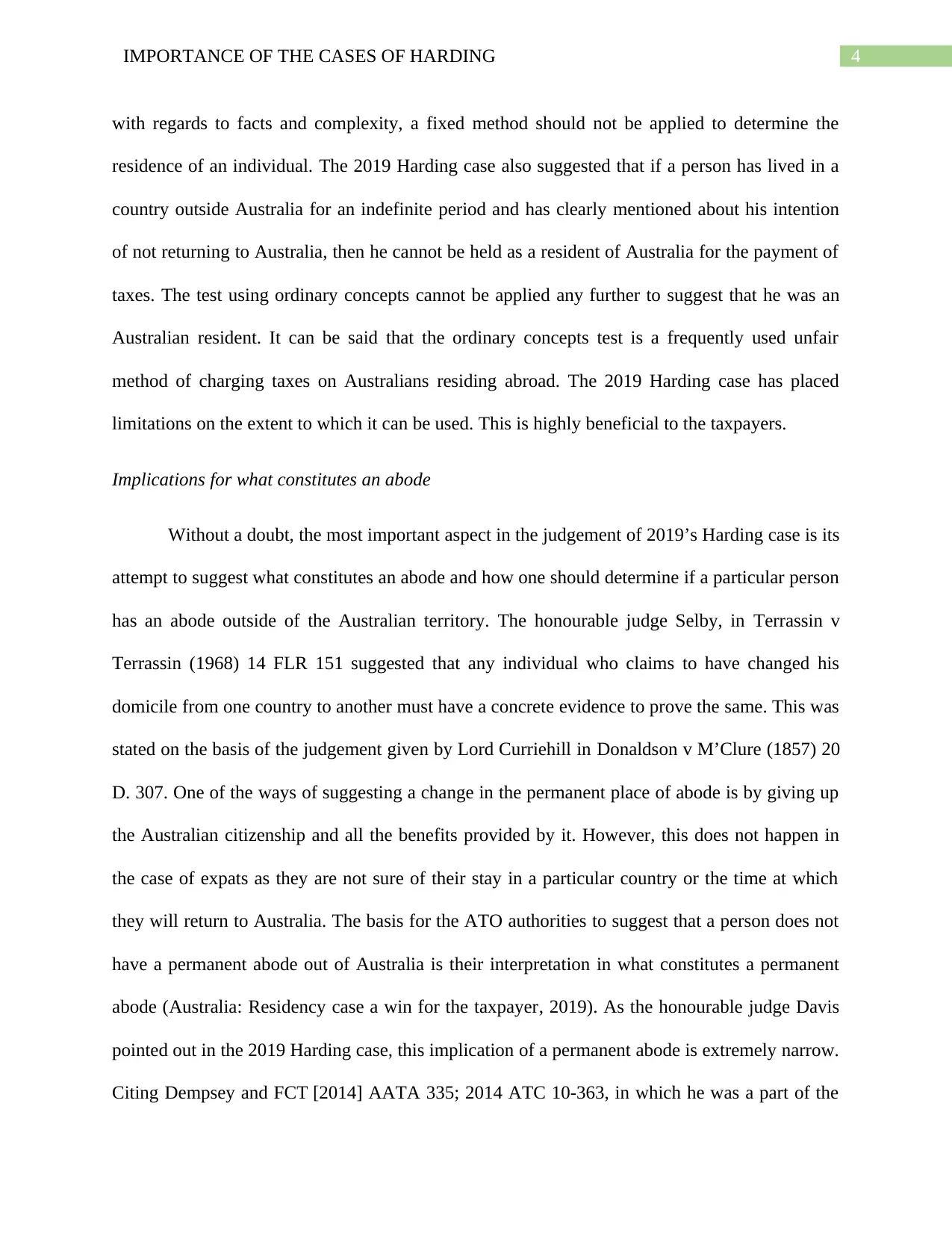
4IMPORTANCE OF THE CASES OF HARDING
with regards to facts and complexity, a fixed method should not be applied to determine the
residence of an individual. The 2019 Harding case also suggested that if a person has lived in a
country outside Australia for an indefinite period and has clearly mentioned about his intention
of not returning to Australia, then he cannot be held as a resident of Australia for the payment of
taxes. The test using ordinary concepts cannot be applied any further to suggest that he was an
Australian resident. It can be said that the ordinary concepts test is a frequently used unfair
method of charging taxes on Australians residing abroad. The 2019 Harding case has placed
limitations on the extent to which it can be used. This is highly beneficial to the taxpayers.
Implications for what constitutes an abode
Without a doubt, the most important aspect in the judgement of 2019’s Harding case is its
attempt to suggest what constitutes an abode and how one should determine if a particular person
has an abode outside of the Australian territory. The honourable judge Selby, in Terrassin v
Terrassin (1968) 14 FLR 151 suggested that any individual who claims to have changed his
domicile from one country to another must have a concrete evidence to prove the same. This was
stated on the basis of the judgement given by Lord Curriehill in Donaldson v M’Clure (1857) 20
D. 307. One of the ways of suggesting a change in the permanent place of abode is by giving up
the Australian citizenship and all the benefits provided by it. However, this does not happen in
the case of expats as they are not sure of their stay in a particular country or the time at which
they will return to Australia. The basis for the ATO authorities to suggest that a person does not
have a permanent abode out of Australia is their interpretation in what constitutes a permanent
abode (Australia: Residency case a win for the taxpayer, 2019). As the honourable judge Davis
pointed out in the 2019 Harding case, this implication of a permanent abode is extremely narrow.
Citing Dempsey and FCT [2014] AATA 335; 2014 ATC 10-363, in which he was a part of the
with regards to facts and complexity, a fixed method should not be applied to determine the
residence of an individual. The 2019 Harding case also suggested that if a person has lived in a
country outside Australia for an indefinite period and has clearly mentioned about his intention
of not returning to Australia, then he cannot be held as a resident of Australia for the payment of
taxes. The test using ordinary concepts cannot be applied any further to suggest that he was an
Australian resident. It can be said that the ordinary concepts test is a frequently used unfair
method of charging taxes on Australians residing abroad. The 2019 Harding case has placed
limitations on the extent to which it can be used. This is highly beneficial to the taxpayers.
Implications for what constitutes an abode
Without a doubt, the most important aspect in the judgement of 2019’s Harding case is its
attempt to suggest what constitutes an abode and how one should determine if a particular person
has an abode outside of the Australian territory. The honourable judge Selby, in Terrassin v
Terrassin (1968) 14 FLR 151 suggested that any individual who claims to have changed his
domicile from one country to another must have a concrete evidence to prove the same. This was
stated on the basis of the judgement given by Lord Curriehill in Donaldson v M’Clure (1857) 20
D. 307. One of the ways of suggesting a change in the permanent place of abode is by giving up
the Australian citizenship and all the benefits provided by it. However, this does not happen in
the case of expats as they are not sure of their stay in a particular country or the time at which
they will return to Australia. The basis for the ATO authorities to suggest that a person does not
have a permanent abode out of Australia is their interpretation in what constitutes a permanent
abode (Australia: Residency case a win for the taxpayer, 2019). As the honourable judge Davis
pointed out in the 2019 Harding case, this implication of a permanent abode is extremely narrow.
Citing Dempsey and FCT [2014] AATA 335; 2014 ATC 10-363, in which he was a part of the
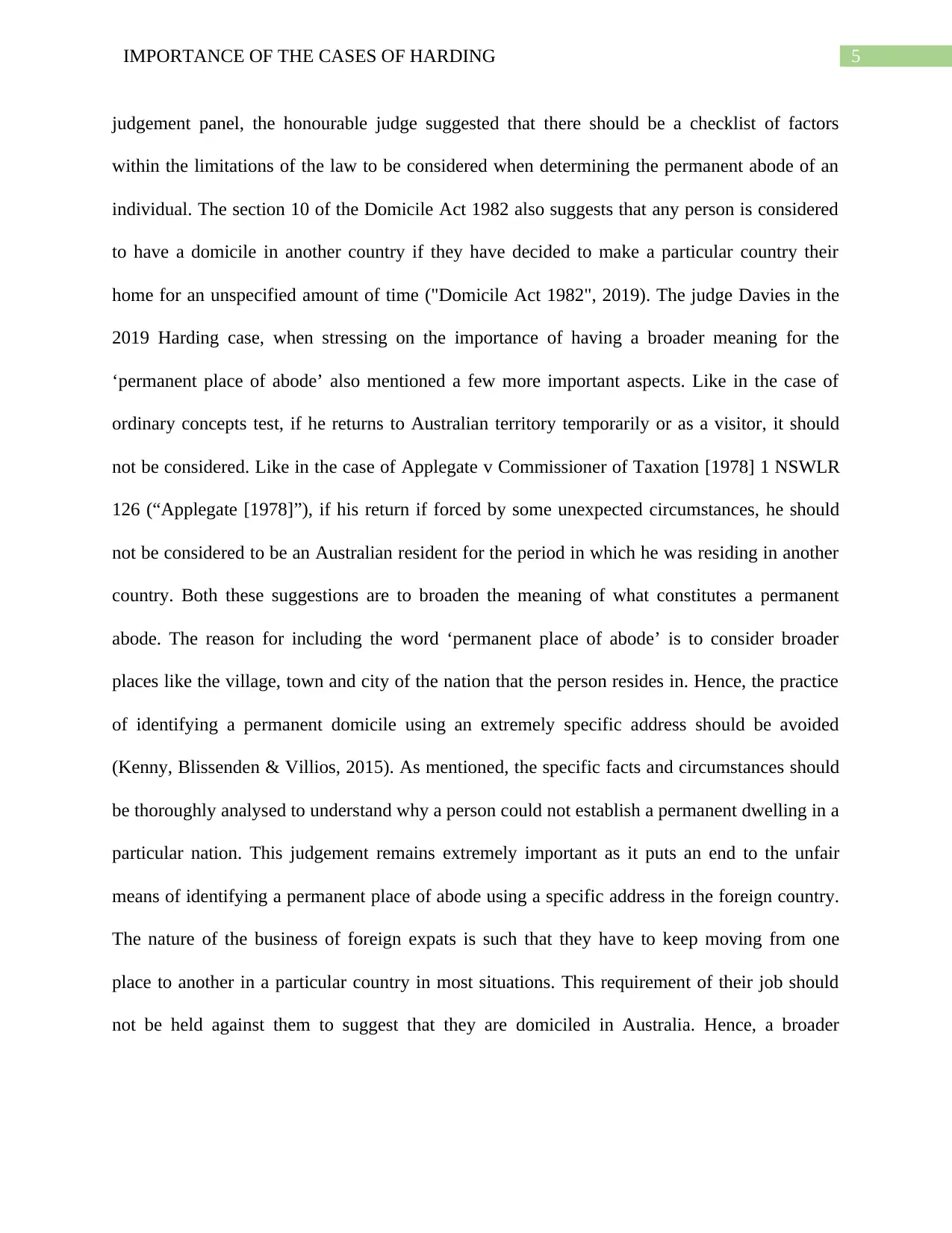
5IMPORTANCE OF THE CASES OF HARDING
judgement panel, the honourable judge suggested that there should be a checklist of factors
within the limitations of the law to be considered when determining the permanent abode of an
individual. The section 10 of the Domicile Act 1982 also suggests that any person is considered
to have a domicile in another country if they have decided to make a particular country their
home for an unspecified amount of time ("Domicile Act 1982", 2019). The judge Davies in the
2019 Harding case, when stressing on the importance of having a broader meaning for the
‘permanent place of abode’ also mentioned a few more important aspects. Like in the case of
ordinary concepts test, if he returns to Australian territory temporarily or as a visitor, it should
not be considered. Like in the case of Applegate v Commissioner of Taxation [1978] 1 NSWLR
126 (“Applegate [1978]”), if his return if forced by some unexpected circumstances, he should
not be considered to be an Australian resident for the period in which he was residing in another
country. Both these suggestions are to broaden the meaning of what constitutes a permanent
abode. The reason for including the word ‘permanent place of abode’ is to consider broader
places like the village, town and city of the nation that the person resides in. Hence, the practice
of identifying a permanent domicile using an extremely specific address should be avoided
(Kenny, Blissenden & Villios, 2015). As mentioned, the specific facts and circumstances should
be thoroughly analysed to understand why a person could not establish a permanent dwelling in a
particular nation. This judgement remains extremely important as it puts an end to the unfair
means of identifying a permanent place of abode using a specific address in the foreign country.
The nature of the business of foreign expats is such that they have to keep moving from one
place to another in a particular country in most situations. This requirement of their job should
not be held against them to suggest that they are domiciled in Australia. Hence, a broader
judgement panel, the honourable judge suggested that there should be a checklist of factors
within the limitations of the law to be considered when determining the permanent abode of an
individual. The section 10 of the Domicile Act 1982 also suggests that any person is considered
to have a domicile in another country if they have decided to make a particular country their
home for an unspecified amount of time ("Domicile Act 1982", 2019). The judge Davies in the
2019 Harding case, when stressing on the importance of having a broader meaning for the
‘permanent place of abode’ also mentioned a few more important aspects. Like in the case of
ordinary concepts test, if he returns to Australian territory temporarily or as a visitor, it should
not be considered. Like in the case of Applegate v Commissioner of Taxation [1978] 1 NSWLR
126 (“Applegate [1978]”), if his return if forced by some unexpected circumstances, he should
not be considered to be an Australian resident for the period in which he was residing in another
country. Both these suggestions are to broaden the meaning of what constitutes a permanent
abode. The reason for including the word ‘permanent place of abode’ is to consider broader
places like the village, town and city of the nation that the person resides in. Hence, the practice
of identifying a permanent domicile using an extremely specific address should be avoided
(Kenny, Blissenden & Villios, 2015). As mentioned, the specific facts and circumstances should
be thoroughly analysed to understand why a person could not establish a permanent dwelling in a
particular nation. This judgement remains extremely important as it puts an end to the unfair
means of identifying a permanent place of abode using a specific address in the foreign country.
The nature of the business of foreign expats is such that they have to keep moving from one
place to another in a particular country in most situations. This requirement of their job should
not be held against them to suggest that they are domiciled in Australia. Hence, a broader
⊘ This is a preview!⊘
Do you want full access?
Subscribe today to unlock all pages.

Trusted by 1+ million students worldwide
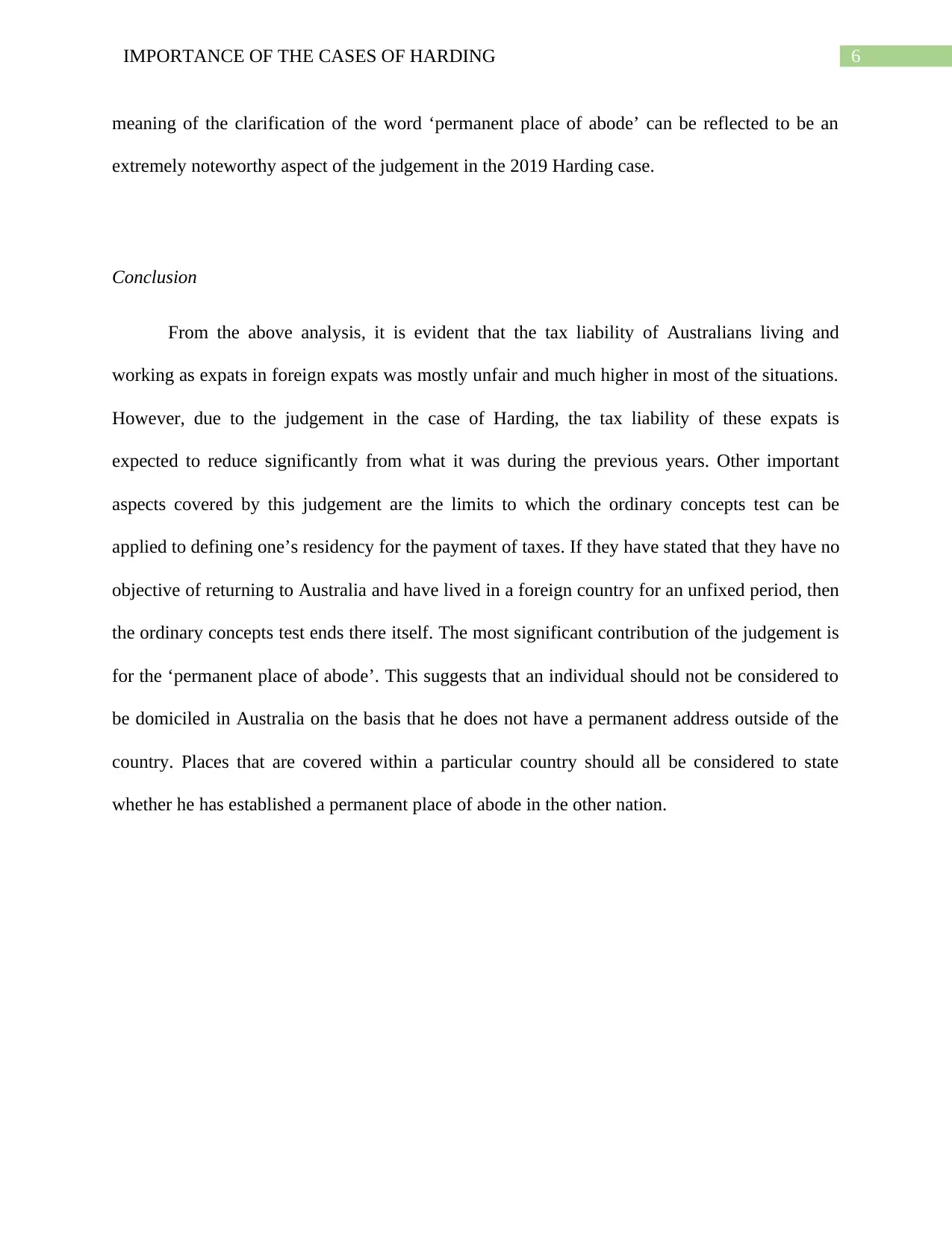
6IMPORTANCE OF THE CASES OF HARDING
meaning of the clarification of the word ‘permanent place of abode’ can be reflected to be an
extremely noteworthy aspect of the judgement in the 2019 Harding case.
Conclusion
From the above analysis, it is evident that the tax liability of Australians living and
working as expats in foreign expats was mostly unfair and much higher in most of the situations.
However, due to the judgement in the case of Harding, the tax liability of these expats is
expected to reduce significantly from what it was during the previous years. Other important
aspects covered by this judgement are the limits to which the ordinary concepts test can be
applied to defining one’s residency for the payment of taxes. If they have stated that they have no
objective of returning to Australia and have lived in a foreign country for an unfixed period, then
the ordinary concepts test ends there itself. The most significant contribution of the judgement is
for the ‘permanent place of abode’. This suggests that an individual should not be considered to
be domiciled in Australia on the basis that he does not have a permanent address outside of the
country. Places that are covered within a particular country should all be considered to state
whether he has established a permanent place of abode in the other nation.
meaning of the clarification of the word ‘permanent place of abode’ can be reflected to be an
extremely noteworthy aspect of the judgement in the 2019 Harding case.
Conclusion
From the above analysis, it is evident that the tax liability of Australians living and
working as expats in foreign expats was mostly unfair and much higher in most of the situations.
However, due to the judgement in the case of Harding, the tax liability of these expats is
expected to reduce significantly from what it was during the previous years. Other important
aspects covered by this judgement are the limits to which the ordinary concepts test can be
applied to defining one’s residency for the payment of taxes. If they have stated that they have no
objective of returning to Australia and have lived in a foreign country for an unfixed period, then
the ordinary concepts test ends there itself. The most significant contribution of the judgement is
for the ‘permanent place of abode’. This suggests that an individual should not be considered to
be domiciled in Australia on the basis that he does not have a permanent address outside of the
country. Places that are covered within a particular country should all be considered to state
whether he has established a permanent place of abode in the other nation.
Paraphrase This Document
Need a fresh take? Get an instant paraphrase of this document with our AI Paraphraser
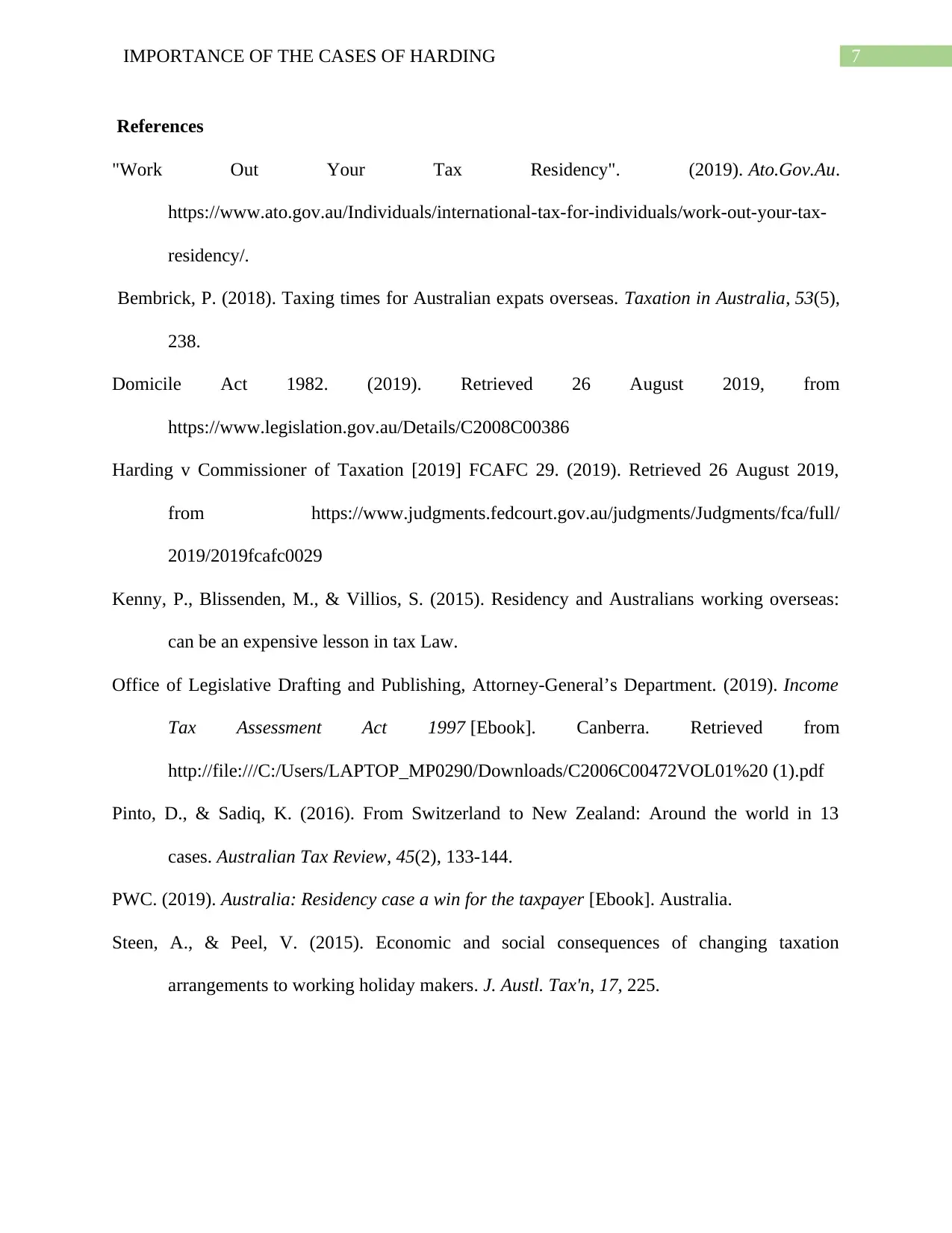
7IMPORTANCE OF THE CASES OF HARDING
References
"Work Out Your Tax Residency". (2019). Ato.Gov.Au.
https://www.ato.gov.au/Individuals/international-tax-for-individuals/work-out-your-tax-
residency/.
Bembrick, P. (2018). Taxing times for Australian expats overseas. Taxation in Australia, 53(5),
238.
Domicile Act 1982. (2019). Retrieved 26 August 2019, from
https://www.legislation.gov.au/Details/C2008C00386
Harding v Commissioner of Taxation [2019] FCAFC 29. (2019). Retrieved 26 August 2019,
from https://www.judgments.fedcourt.gov.au/judgments/Judgments/fca/full/
2019/2019fcafc0029
Kenny, P., Blissenden, M., & Villios, S. (2015). Residency and Australians working overseas:
can be an expensive lesson in tax Law.
Office of Legislative Drafting and Publishing, Attorney-General’s Department. (2019). Income
Tax Assessment Act 1997 [Ebook]. Canberra. Retrieved from
http://file:///C:/Users/LAPTOP_MP0290/Downloads/C2006C00472VOL01%20 (1).pdf
Pinto, D., & Sadiq, K. (2016). From Switzerland to New Zealand: Around the world in 13
cases. Australian Tax Review, 45(2), 133-144.
PWC. (2019). Australia: Residency case a win for the taxpayer [Ebook]. Australia.
Steen, A., & Peel, V. (2015). Economic and social consequences of changing taxation
arrangements to working holiday makers. J. Austl. Tax'n, 17, 225.
References
"Work Out Your Tax Residency". (2019). Ato.Gov.Au.
https://www.ato.gov.au/Individuals/international-tax-for-individuals/work-out-your-tax-
residency/.
Bembrick, P. (2018). Taxing times for Australian expats overseas. Taxation in Australia, 53(5),
238.
Domicile Act 1982. (2019). Retrieved 26 August 2019, from
https://www.legislation.gov.au/Details/C2008C00386
Harding v Commissioner of Taxation [2019] FCAFC 29. (2019). Retrieved 26 August 2019,
from https://www.judgments.fedcourt.gov.au/judgments/Judgments/fca/full/
2019/2019fcafc0029
Kenny, P., Blissenden, M., & Villios, S. (2015). Residency and Australians working overseas:
can be an expensive lesson in tax Law.
Office of Legislative Drafting and Publishing, Attorney-General’s Department. (2019). Income
Tax Assessment Act 1997 [Ebook]. Canberra. Retrieved from
http://file:///C:/Users/LAPTOP_MP0290/Downloads/C2006C00472VOL01%20 (1).pdf
Pinto, D., & Sadiq, K. (2016). From Switzerland to New Zealand: Around the world in 13
cases. Australian Tax Review, 45(2), 133-144.
PWC. (2019). Australia: Residency case a win for the taxpayer [Ebook]. Australia.
Steen, A., & Peel, V. (2015). Economic and social consequences of changing taxation
arrangements to working holiday makers. J. Austl. Tax'n, 17, 225.

8IMPORTANCE OF THE CASES OF HARDING
⊘ This is a preview!⊘
Do you want full access?
Subscribe today to unlock all pages.

Trusted by 1+ million students worldwide

9IMPORTANCE OF THE CASES OF HARDING
Paraphrase This Document
Need a fresh take? Get an instant paraphrase of this document with our AI Paraphraser

10IMPORTANCE OF THE CASES OF HARDING

11IMPORTANCE OF THE CASES OF HARDING
⊘ This is a preview!⊘
Do you want full access?
Subscribe today to unlock all pages.

Trusted by 1+ million students worldwide
1 out of 12
Related Documents
Your All-in-One AI-Powered Toolkit for Academic Success.
+13062052269
info@desklib.com
Available 24*7 on WhatsApp / Email
![[object Object]](/_next/static/media/star-bottom.7253800d.svg)
Unlock your academic potential
Copyright © 2020–2026 A2Z Services. All Rights Reserved. Developed and managed by ZUCOL.





